Proper permits for resin-bound gravel are essential in the UK to avoid hefty council fines. Any area over 5m² requires planning permission, and you’ll need to prove your installation meets SUDS requirements with proper drainage. Think of it like getting a building permit for an extension – it’s better to sort the paperwork first than face penalties later.
Contact your local council before starting work, keep all documentation organised, and ensure your chosen installer holds proper certifications. Common installations like driveways and paths need a permeable sub-base that allows rainwater to drain naturally. Regular checks of your surface will spot any issues that might affect your permit compliance.
Key Takeaways
Check if your driveway’s over 5m² – you’ll need planning permission for larger areas to dodge council fines.
Make sure your surface meets SUDS rules (like many new UK driveways must). This prevents flooding and keeps you on the right side of regulations.
Only use permeable materials with proper BBA approval – think of it like an MOT for your driveway materials. This ensures proper drainage and keeps you legally compliant.
Keep all your paperwork – planning permission, installation records, and maintenance logs. It’s a lifesaver when the council comes knocking for inspections.
Pick installers who know their stuff – look for proper certifications and solid experience with resin-bound projects. A cowboy contractor could leave you facing hefty fines.
Understanding Local Regulations

Understanding local regulations is crucial before installing resin-bound gravel in the UK. Most councils require compliance with Sustainable Urban Drainage Systems (SUDS) to manage rainwater properly. Think of SUDS as your garden’s drainage system – it needs to handle those typical British downpours effectively. The incorporation of natural drainage features in your design can significantly enhance water management in the area.
Your chosen resin and installation method must meet local building standards, particularly regarding drainage. It’s like ensuring your driveway won’t turn into a paddling pool during heavy rain. Additionally, ensure that your materials meet BBA approval to guarantee quality and performance.
Check that your materials comply with FeRFA guidelines – they’re the industry standard in Britain. Your installer should hold proper certifications, especially for handling potentially dangerous materials. Regular checks might be needed to ensure everything stays up to scratch and meets environmental rules.
Keep all paperwork handy – your local council might want to see it.
Pro tip: Pop down to your local planning office or check their website first. They’ll have specific requirements for your area, and it’s better to know these before you start rather than face costly corrections later.
Importance of Planning Permission
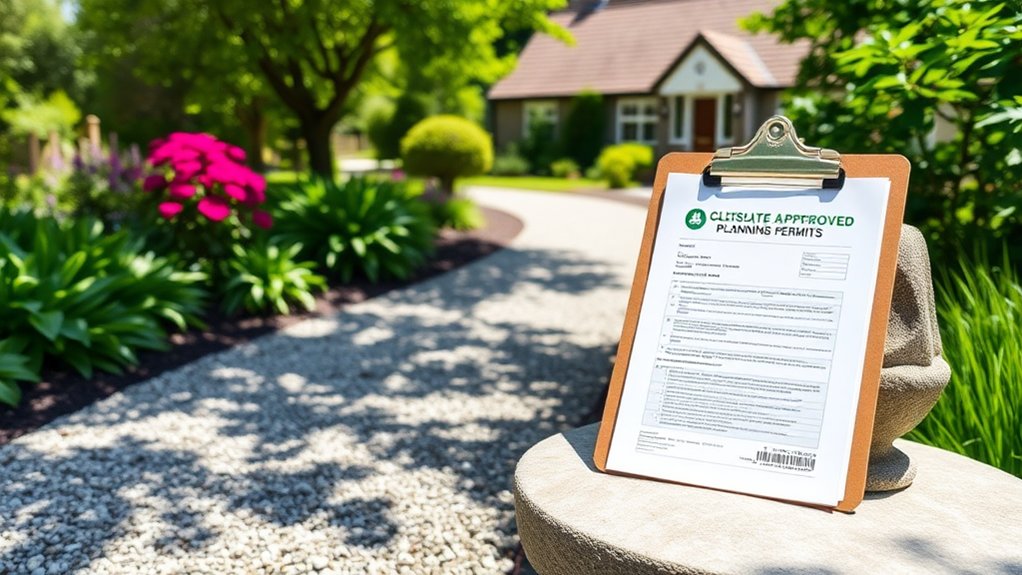
Planning permission rules are critical when installing resin-bound gravel driveways in the UK.
Whilst these surfaces typically don’t need permission due to their permeable nature, several factors affect requirements. You’ll need permission if your driveway is larger than 5m² and non-permeable. Additionally, it’s important to note that permeable driveways typically do not require planning permission in designated areas. Proper drainage management is essential to comply with local regulations and avoid penalties.
Local rules vary, particularly for flats and homes in conservation areas. For example, a Victorian terraced house in a protected area would need extra checks before any driveway work begins.
It’s best to ring your local council’s planning department before starting – they’ll clarify exactly what you need.
Getting proper permission matters – it prevents fines and supports local drainage systems.
Plus, you’ll avoid the headache of having to redo work that doesn’t meet regulations. Don’t skip this step, even if your neighbours haven’t bothered with permission for their driveways.
Ensuring Drainage and Permeability Compliance
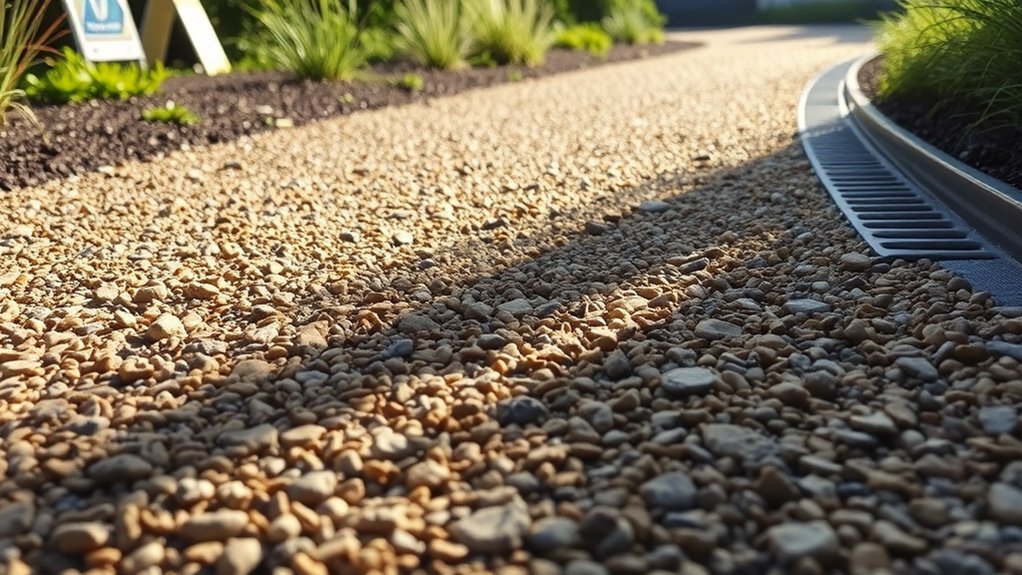
Proper drainage and permeability are vital for your resin-bound gravel driveway to meet UK regulations. Your installation must include a permeable base that effectively manages rainwater, meeting SUDS requirements and helping prevent local flooding. Most properly installed resin driveways don’t need extra drainage, but if you’re in a rainy region like Wales or Scotland, additional measures might be worth considering. Regular checks ensure your driveway maintains its water-draining qualities – much like testing your gutters before winter. Additionally, ensuring your driveway is compliant with SUDS requirements will help mitigate urban flooding risks. The material itself acts as a natural filter, enhancing underground water levels and supporting local ecosystems. Local council rules vary, so check your area’s specific requirements to avoid penalties. Keep all paperwork from your installation and maintenance work; it’s as important as keeping your home’s building certificates. Think of it as insurance – you’ll be glad to have it if questions arise about your driveway’s compliance.
Preparing the Base for Installation
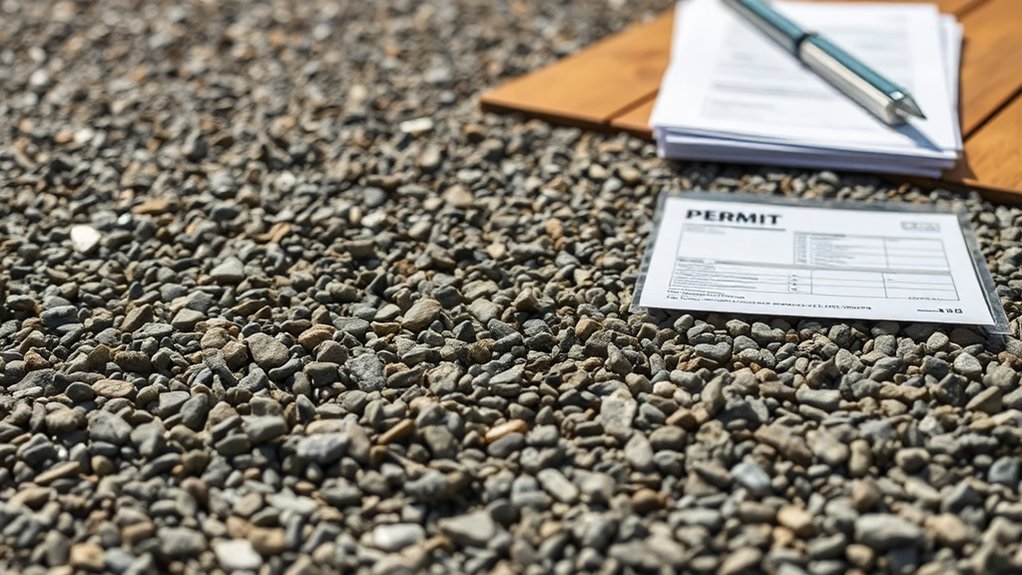
Clean and dry the base thoroughly before laying resin-bound gravel.
Sort out any cracks or damage straight away – leaving them will only cause headaches later.
Check your edging meets UK building standards, as dodgy edges can ruin even the best installation job.
Think of it like painting a wall – you wouldn’t start without proper prep, and this is no different.
Surface Cleanliness and Dryness
Clean, Dry Surface Preparation
When laying resin-bound gravel, a spotlessly clean and dry surface is crucial for proper bonding and long-term durability. Begin with thorough pressure washing to remove all debris and treat any weeds. The surface must be smooth and completely dry, as any moisture will interfere with the resin’s curing process.
| Task | Purpose |
|---|---|
| Weed Control | Stops weeds disrupting the resin |
| Debris Removal | Ensures solid foundation |
| Dry Conditions | Stops moisture affecting cure time |
| Primer Application | Improves grip to sub-base |
Choose a dry day for installation, with suitable temperatures for proper curing. Getting this groundwork right helps control moisture and ensures your installation meets required standards.
Repair Existing Cracks
Check and repair any cracks in your base before laying resin-bound gravel.
First, inspect the cracks to see how deep and wide they run. Give them a thorough clean to remove dirt and loose bits – a wire brush works well for this.
Pick a suitable repair product that matches your base material, like epoxy filler for concrete surfaces. For larger cracks, you might need reinforcement materials to prevent future problems.
Once you’ve filled all cracks, make sure the base is completely level. Getting these repairs right is crucial – dodgy prep work could lead to costly fixes down the line, and you might even face penalties for substandard installation.
Edging Requirements Compliance
Proper edging is crucial for resin-bound gravel installations in the UK. Common edging choices include granite setts, aluminium strips, block paving or paving slabs – all must meet manufacturer guidelines.
Your base needs a layer of washed stone to ensure stability and proper drainage. Level surfaces are essential, as is thorough compaction. Existing walls can serve as natural edges, but check they meet local building regulations.
Using certified contractors helps ensure compliance and quality finish. Think of edging like a picture frame – it needs to be sturdy and level to protect what’s inside.
Getting it right first time saves money and hassle later, whilst creating an attractive, long-lasting surface that meets all UK standards.
Environmental Considerations
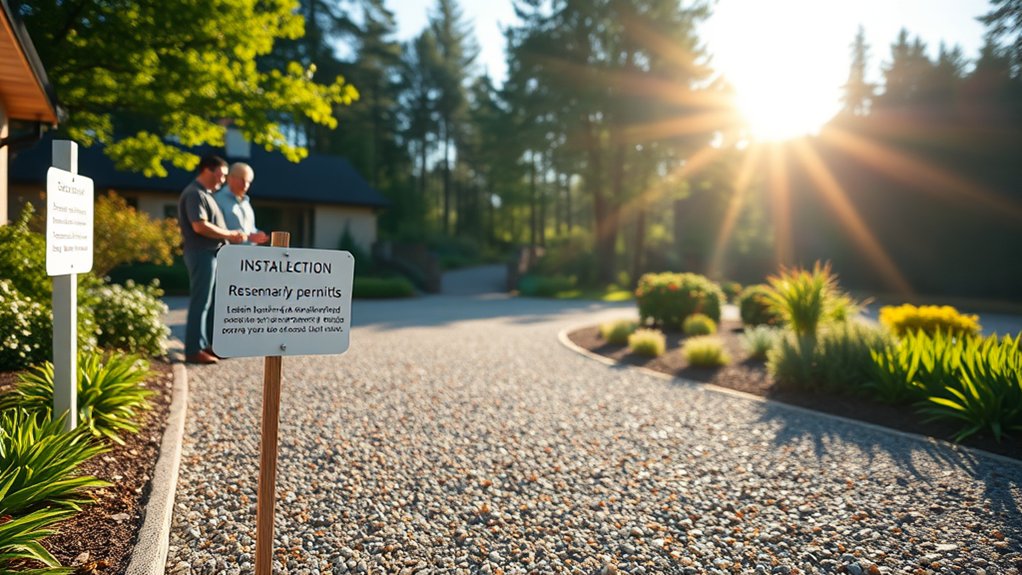
Environmental Considerations
Proper environmental planning is vital when laying resin-bound gravel, particularly to comply with SUDS regulations and avoid penalties.
Key points to consider:
- Sustainable Materials: Mix in recycled aggregates like crushed glass or plastic. This cuts waste and helps meet UK environmental standards.
- Ecological Impact: Choose permeable surfaces that let rainwater drain naturally. This helps local wildlife and maintains healthy soil conditions.
- Flood Management: Resin-bound surfaces reduce puddles and flooding risks common to British weather, taking pressure off local drainage systems.
A well-installed resin driveway ticks all these boxes whilst looking smart – making it a practical choice for UK homeowners who want to stay within regulations.
Maintaining Documentation and Records

Essential documentation and records must be maintained for all resin-bound gravel installations in the UK. This includes planning permissions, SUDS compliance paperwork, and detailed records of base preparation work.
Keep both digital and paper copies of all documents, properly organised and readily available for council inspections or audits.
Standard document templates help streamline record-keeping – for instance, using consistent forms for material specifications and installation checklists. Store records securely, with regular digital backups, and maintain proper filing systems for quick retrieval when needed. A simple spreadsheet tracking compliance deadlines and any remedial works proves invaluable during official reviews.
Common documents to maintain:
- Planning permissions
- Material specifications
- Installation photos
- Base preparation details
- Customer sign-offs
- SUDS compliance certificates
- Maintenance records
Following these practices ensures you’re covered legally whilst making day-to-day operations more efficient.
Engaging Qualified Professionals
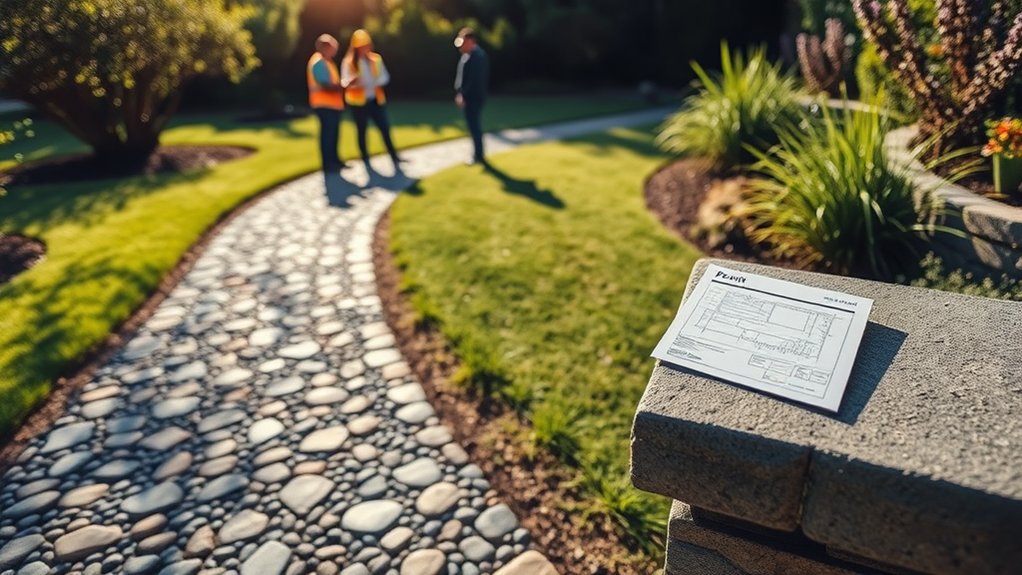
Engaging Professional Installers
Quality resin-bound gravel installations depend heavily on skilled workmanship. Three essential points to check:
- Professional Certification: Look for installers with proper UK trade certifications – particularly those recognised by bodies like CITB or NVQ qualifications in surfacing.
- Installation Track Record: Pick firms with solid experience in resin-bound projects. A reputable installer should happily show you their previous local work and references.
- After-Care Service: Choose companies offering clear support policies. They should respond promptly to queries and handle any snags that might crop up post-installation.
Regular Maintenance and Inspections

Regular upkeep of your resin-bound gravel surface is vital.
Sweep regularly with a stiff broom and rinse with cold water to remove everyday dirt. Use a pressure washer once or twice yearly for deeper cleaning, but keep the pressure low to protect the resin.
Check your surface often for signs of wear, blocked drainage or loose stones. Remove leaves, moss and weeds as soon as you spot them to prevent staining – just as you’d with a patio or driveway.
Most homeowners manage routine cleaning themselves, but it’s worth getting a professional check every few years, much like servicing your boiler.
These simple steps help maintain your surface’s looks and function, whilst meeting local council requirements.
Staying Informed on Regulatory Changes
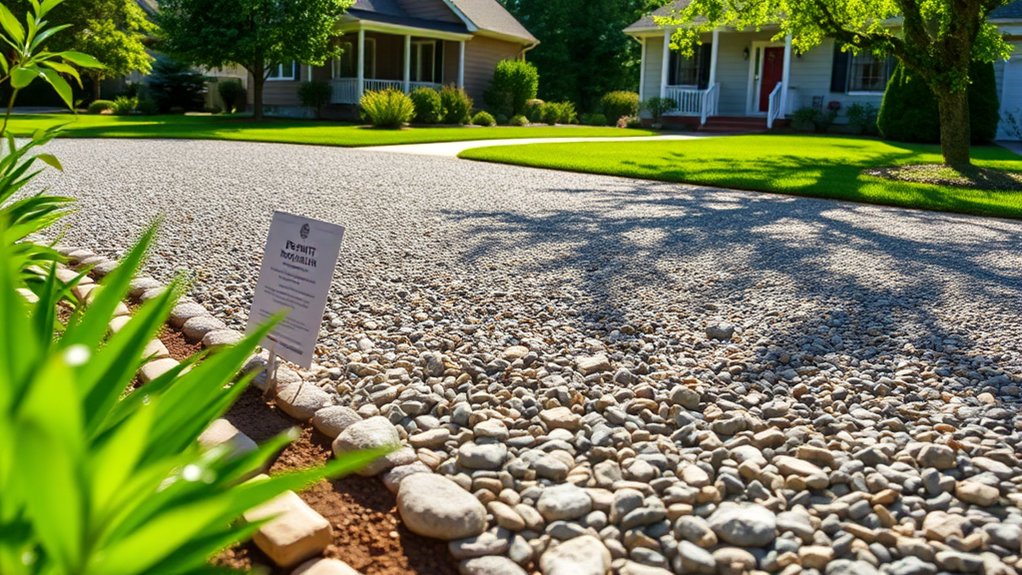
Staying on top of regulations is vital for resin-bound gravel projects in the UK, as changes can affect your installation methods and upkeep. Take these key steps:
- Join Compliance Training Sessions: Book regular workshops to ensure your team knows current rules, particularly UK-specific standards like SUDS (Sustainable Urban Drainage Systems).
- Track Official Updates: Follow updates from UK bodies like FeRFA (The Resin Flooring Association). For example, when new environmental guidelines emerge about permeable paving, you’ll need to adjust your methods quickly.
- Connect with Industry Peers: Pop along to trade shows and local builder networks. A chat with fellow installers often reveals practical ways to handle new regulations, like recent changes to permeable driveway requirements.
These simple steps help protect your business whilst ensuring top-quality installations that meet all UK standards.
Frequently Asked Questions
What Is the Typical Cost for Resin-Bound Gravel Permits?
Resin-bound gravel permits typically cost between £40 to £120 in the UK. Costs vary by council and may include additional charges for site inspections or planning reviews. Your local authority’s specific requirements will determine the final fee.
How Long Does the Permit Application Process Usually Take?
Permit processing times typically range from 2 days to 8 weeks in the UK, varying by council and application complexity. Local authority workloads and missing documentation often affect waiting periods, so it’s worth submitting a thorough application from the start.
Can I Apply for a Permit Online?
Yes, you can apply for permits online through our digital submission system. Ensure you have created an account on our digital portal, which simplifies the application process and allows for easy payment. The system works similarly to other UK government services, such as planning permission applications.
What Happens if My Permit Application Is Denied?
Should your permit application be denied, you have the right to lodge an appeal. Whilst awaiting the appeal process, consider reviewing alternative options that address the reasons for refusal – for example, if denied due to materials, switching from concrete to permeable paving might help. Taking this practical approach can improve your chances of approval and reduce delays to your project.
Are There Specific Regulations for Residential Versus Commercial Installations?
Residential and commercial resin-bound gravel installations follow different guidelines in the UK. Residential projects require proper sub-base preparation and water drainage compliance, whilst commercial sites must meet strict load-bearing standards and use heavier-duty foundations. Getting these requirements right ensures your installation meets British building regulations and stands the test of time.
Conclusion
The path to proper resin-bound gravel installation needn’t be complicated. Check your local council’s planning requirements, ensure your surface meets SuDS drainage standards, and keep all paperwork properly filed. Working with BALI-registered contractors and scheduling regular maintenance checks will keep you in good standing with authorities. A bit of due diligence now prevents costly fines later.
